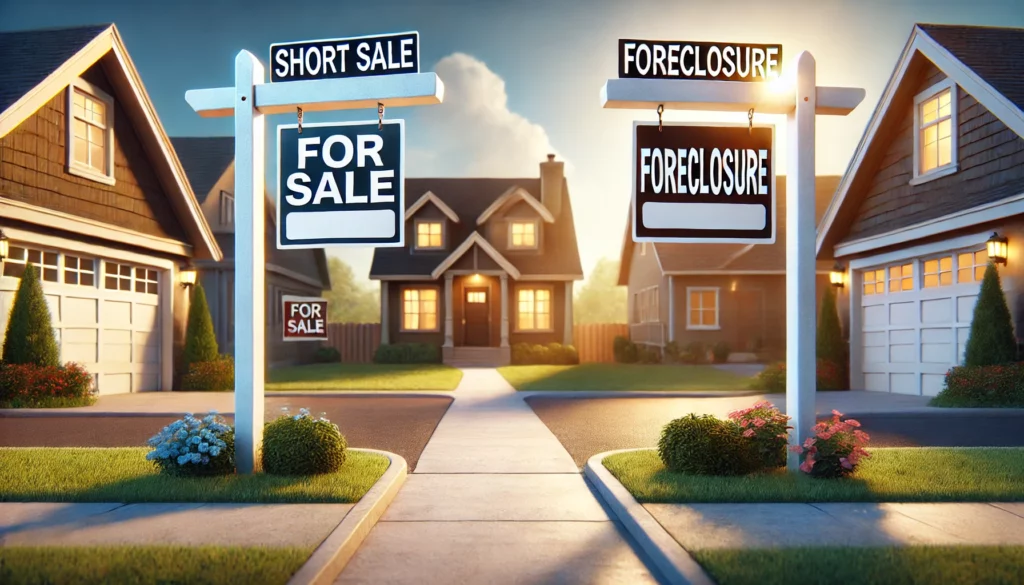Short Sale vs. Foreclosure – What’s the Difference?

Introduction
When you’re facing financial difficulties, it’s normal to feel overwhelmed, stressed, and unsure of your next steps. If you’re currently behind on mortgage payments or worried about foreclosure, you may be searching for solutions to avoid losing your home. The terms “short sale” and “foreclosure” might have come up, but you probably don’t know exactly what each entails or which one is the best route for your situation.
You’re likely concerned about the long-term impact on your credit score, the costs involved, and whether either option will allow you to walk away with any dignity or financial recovery. Perhaps you’re wondering if there’s a way to keep your home or sell it quickly for cash without all the hassle. It’s crucial to understand the differences between short sales and foreclosures, and how each one could affect your financial future. In this blog, we’ll dive deep into what a short sale and foreclosure are, the pros and cons of each, and why selling your house to a real estate investor might be a better choice.
What Is a Short Sale? Understanding the Basics
A short sale occurs when a homeowner sells their property for less than the amount they owe on their mortgage, and the lender agrees to accept the sale price as payment in full for the loan. In other words, the bank or lender “forgives” the remaining debt. This process can be an alternative to foreclosure if you’re struggling to make your mortgage payments but don’t want to face the damaging consequences of foreclosure.
Short sale vs foreclosure—the key difference here is that in a short sale, you’re actively participating in the sale process, typically with the lender’s permission. In contrast, foreclosure involves the bank or lender seizing your property because you’ve failed to make payments. In a short sale, you have more control over the outcome, and it can be a less damaging option for your credit score compared to foreclosure. However, the process is far from simple and can take months to complete.
One of the most attractive aspects of a short sale is that it may help you avoid the foreclosure process altogether. However, it’s important to note that you may still be responsible for paying the deficiency balance (the difference between what you owe and what the home sells for), depending on your state and the agreement with your lender. For more information on how deficiency judgments work, refer to this detailed guide from Investopedia.
Why is a short sale worth considering?
- Less Impact on Your Credit: A short sale generally causes less damage to your credit score than a foreclosure. While both will impact your credit, a short sale can be an opportunity to minimize the damage.
- More Control: In a short sale, you’re involved in the process and can sell the home to a buyer of your choosing, which may include selling for cash to a real estate investor.
- Avoid Foreclosure: This can save you from the public stigma and financial damage that foreclosure brings.
However, it’s crucial to remember that the short sale process can be time-consuming and complex. Lenders are often slow to approve short sale offers, and you may face a lot of paperwork and waiting before you receive approval. That leads us to the next option you might consider: foreclosure.
What Is Foreclosure? The Risks You Need to Know
Foreclosure occurs when you default on your mortgage payments, and the lender steps in to seize your property. Unlike a short sale, in a foreclosure, you have no control over the sale of the home, and the process is managed entirely by the lender. Once the bank or lender takes possession of the home, they’ll typically sell it at an auction or through a real estate agent in an attempt to recoup their losses.
The most significant disadvantage of foreclosure is that it severely impacts your credit score, potentially dropping it by 100 to 200 points or more. This can make it incredibly difficult to qualify for a mortgage, car loan, or even a job, depending on the employer’s credit policies. Foreclosure also tends to leave you with little or no financial relief, as the lender may come after you for the remaining balance on the loan, known as the deficiency balance.
For more details on the foreclosure process and its consequences, consider visiting the FasterCapital for tips and guidelines.
Risks of foreclosure include:
- Severe Impact on Credit: A foreclosure can stay on your credit report for up to seven years, making it incredibly difficult to get approved for future loans.
- Deficiency Judgment: In some states, even after foreclosure, the lender can seek a deficiency judgment against you for the remaining loan balance.
- Loss of Control: You lose control over the sale of your home, and there is no guarantee that you’ll receive any funds from the sale of the home.
But what are the potential benefits of foreclosure?
- Resolution of Debt: While foreclosure doesn’t allow you to recover any equity from your home, it does resolve the debt, meaning you no longer have to make mortgage payments.
- Immediate Relief: Once the foreclosure process is complete, the bank owns the property, and you’re free to move on, though with significant consequences.
If you’re facing foreclosure, you might be asking yourself, “Is there a better way out of this situation?” The truth is, there may be better alternatives. That’s where selling your home for cash to a real estate investor comes into play.
Short Sale vs. Foreclosure: Which One Is Better?
When you’re deciding between a short sale and a foreclosure, it’s important to consider several factors: how much control you want in the process, how much time you have, and how much damage you’re willing to accept to your credit score.
Short Sale Pros:
- Less damage to credit: A short sale can have a significantly less negative impact on your credit score than a foreclosure.
- Faster Process: While it can still take time, a short sale can be completed faster than the lengthy foreclosure process.
- Possible Cash Offer: When you sell to a cash buyer, like a real estate investor, you can quickly close the deal and walk away with cash in hand.
Short Sale Cons:
- Complex Process: Short sales involve a lot of paperwork and approval from the lender, which can drag the process out for months.
- Lender Approval: Even if you find a buyer, the lender may reject your sale offer, causing delays or the loss of a potential deal.
- Deficiency Balance: You may still owe the difference between your mortgage and the sale price.
Foreclosure Pros:
- Immediate Relief from Payments: Foreclosure allows you to stop making mortgage payments and can offer immediate financial relief in that sense.
- No Need for Approval: Since the lender is taking control of the sale, there’s no need for buyer or lender approval.
Foreclosure Cons:
- Long-Term Damage to Credit: Foreclosure can devastate your credit score and take years to recover from.
- Possible Deficiency Judgment: In many states, even after foreclosure, you could still owe the bank money, which leaves you financially vulnerable.
- Lack of Control: You lose all control over the sale of your home and may end up with far less than you owe.
Why Selling Your House for Cash Could Be the Best Option
While both short sales and foreclosures can be long, painful processes with significant downsides, there is another option that offers more control and less damage to your finances: selling your house for cash to a real estate investor.
Unlike traditional methods of selling or facing foreclosure, selling your house to a cash buyer offers many advantages:
- No Need for Repairs: Investors will buy your property as-is, meaning you don’t have to spend money fixing up your home.
- Quick Process: The closing process for a cash sale is typically much faster, often in a matter of days, rather than months.
- Avoid Foreclosure: If you’re on the brink of foreclosure, selling your home for cash can help you avoid the foreclosure process entirely and settle your debt quickly.
- No Fees or Commissions: Unlike working with a real estate agent, there are no realtor fees or commissions when you sell to a cash buyer.
When you choose to sell your home to a real estate investor, you’re taking control of the situation. If you’re facing foreclosure, this can help you stop foreclosure quickly, and potentially walk away with some financial relief. For more information on how to stop the bank from foreclosing on your house, check out our How To Stop The Bank From Foreclosing On Your House page.
Conclusion: Making the Right Decision for Your Financial Future
Whether you’re facing foreclosure or contemplating a short sale, it’s important to carefully weigh the pros and cons of each option. A short sale might allow you to minimize damage to your credit, but it can be a lengthy and complex process that often drags on for months. Foreclosure, while offering an immediate end to your mortgage obligations, comes with severe consequences for your credit and long-term financial health.
Ultimately, the best course of action may be to sell your home for cash. This option not only saves you from foreclosure but also allows you to avoid the hassle, waiting, and potential headaches associated with short sales. Selling to a cash buyer like Local Home Buyer can provide a quick, hassle-free solution, enabling you to move on from a difficult situation with dignity and financial relief.
At Local Home Buyer, we understand the stress and uncertainty you’re facing. That’s why we offer a simple, transparent process to buy your home for cash, as-is, without the need for repairs or lengthy negotiations. If you’re ready to explore how selling your home for cash can help you avoid foreclosure and start fresh, contact us today. We’ll work with you every step of the way to ensure a smooth and stress-free experience.
Let us help you take control of your situation and move forward with confidence.
